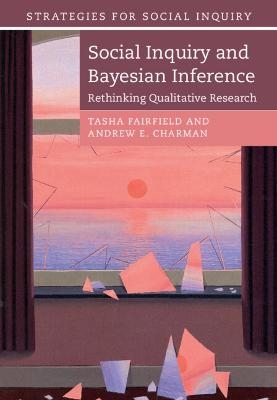
Social Inquiry and Bayesian Inference
Cambridge University Press (Verlag)
978-1-108-42164-5 (ISBN)
Fairfield and Charman provide a modern, rigorous and intuitive methodology for case-study research to help social scientists and analysts make better inferences from qualitative evidence. The book develops concrete guidelines for conducting inference to best explanation given incomplete information; no previous exposure to Bayesian analysis or specialized mathematical skills are needed. Topics covered include constructing rival hypotheses that are neither too simple nor overly complex, assessing the inferential weight of evidence, counteracting cognitive biases, selecting cases, and iterating between theory development, data collection, and analysis. Extensive worked examples apply Bayesian guidelines, showcasing both exemplars of intuitive Bayesian reasoning and departures from Bayesian principles in published case studies drawn from process-tracing, comparative, and multimethod research. Beyond improving inference and analytic transparency, an overarching goal of this book is to revalue qualitative research and place it on more equal footing with respect to quantitative and experimental traditions by illustrating that Bayesianism provides a universally applicable inferential framework.
Tasha Fairfield is an Associate Professor at the London School of Economics, with a Ph.D in political science from the University of California, Berkeley, and an M.S. in physics from Stanford University. Her publications include Private Wealth and Public Revenue in Latin America (Cambridge, 2015), which won the Donna Lee Van Cott Book Award. Andrew E. Charman is a Lecturer and Researcher in Physics at the University of California, Berkeley, and an expert in Bayesian statistics. Beyond analyzing measurements of antimatter and the foundations of quantum mechanics, he has explored methods for optimal congressional apportionment and statistical mechanical models of gerrymandering. His previous work with Tasha Fairfield received APSA's QMMR Sage Paper Award.
Contents; Acknowledgements; Part I. Foundations: 1. Introduction: Bayesian reasoning for qualitative research; 2. Fundamentals of Bayesian probability; Part II. Operationalizing Bayesian Reasoning in Qualitative Research: 3. Heuristic Bayesian reasoning; 4. Explicit Bayesian analysis; 5. Bayesian analysis with multiple cases; 6. Hypotheses and priors revisited; 7. Scrutinizing qualitative research; Part III. Bayesianism in Methodological Perspective: 8. Comparing logical Bayesianism to frequentism; 9. A unified framework for inference; Part IV. Bayesian Implications for Research Design: 10. Iterative research; 11. Test strength; 12. Case selection; 13. Worked examples; References; Contents; Index.
| Erscheinungsdatum | 25.07.2022 |
|---|---|
| Reihe/Serie | Strategies for Social Inquiry |
| Zusatzinfo | Worked examples or Exercises |
| Verlagsort | Cambridge |
| Sprache | englisch |
| Maße | 173 x 250 mm |
| Gewicht | 1330 g |
| Themenwelt | Sozialwissenschaften ► Politik / Verwaltung ► Politische Theorie |
| Sozialwissenschaften ► Soziologie ► Empirische Sozialforschung | |
| ISBN-10 | 1-108-42164-4 / 1108421644 |
| ISBN-13 | 978-1-108-42164-5 / 9781108421645 |
| Zustand | Neuware |
| Haben Sie eine Frage zum Produkt? |
aus dem Bereich


